- Home
- Fannie Flagg
The Whole Town's Talking
The Whole Town's Talking Read online
The Whole Town’s Talking is a work of fiction. All incidents and dialogue, and all characters with the exception of some well-known historical and public figures, are products of the author’s imagination and are not to be construed as real. Where real-life historical or public figures appear, the situations, incidents, and dialogues concerning those persons are entirely fictional and are not intended to depict actual events or to change the entirely fictional nature of the work. In all other respects, any resemblance to persons living or dead is entirely coincidental.
Copyright © 2016 by Willina Lane Productions, Inc.
All rights reserved.
Published in the United States by Random House, an imprint and division of Penguin Random House LLC, New York.
RANDOM HOUSE and the HOUSE colophon are registered trademarks of Penguin Random House LLC.
Grateful acknowledgment is made to the following for permission to reprint previously published material:
ALFRED MUSIC: Excerpt from “I Only Have Eyes for You,” words by Al Dubin, music by Harry Warren, copyright © 1934 (renewed) WB Music Corp. All rights reserved. Used by permission of Alfred Music.
ALFRED MUSIC AND HAL LEONARD LLC: Excerpt from “They Can’t Take That Away from Me” (from Shall We Dance), music and lyrics by George Gershwin and Ira Gershwin, copyright © 1936 (renewed) Nokawi Music, Ira Gershwin Music, and Frankie G. Songs. All rights for Nokawi Music administered by Imagem Sounds. All rights for Ira Gershwin Music administered by WB Music Corp. All rights for Frankie G. Songs administered by Songs Music Publishing. All rights reserved. Used by permission of Alfred Music and Hal Leonard LLC.
Hardback ISBN 9781400065950
International edition ISBN 9780399589560
Ebook ISBN 9780399588297
randomhousebooks.com
v4.1
ep
Contents
Cover
Title Page
Copyright
What the Crow Knows
Prologue
And So It Begins….
Lordor Nordstrom
Love and Marriage
A Swedish Lady
The Verdict
Katrina Olsen
Springfield, Missouri
The Man in the Derby
Missouri
Chicago Razzle-Dazzle
Missouri
The Adventure
The Girl on the Platform
The Box Social
Missouri
A Daughter’s Promise
1891
Chicago
Neighbors
The 1900s: A New Era
The Town
Miss Lucille Beemer
Chicago
The Neighbor Boy
The Telegram
Spring Has Sprung, and So Has a Young Man’s Fancy
Meet Me at the Fair
More Than Meets the Eye
Elmwood Springs, Missouri
Chicago
Is It You?
In the Glove Department
July Fourth
Chicago
Oregon
A Sad Time
A Change of Address
Life Moves On
Reunited
Nancy Knott
The Dating Game
More Good Friends
The Twenties: All the Wonderful Things in Store
Elmwood Springs Is Looking Up
The Shoe Department
Ingrid Nordstrom
Fun at Still Meadows
The Wedding
The Little White Box
Missing Mrs. Knott
The Thirties: The Show Must Go On
Dancing Cows
Unexpected Visitors
Things Are Looking Up
Problem Solving
The Trap
Elner’s Dream
It Don’t Mean a Thing If It Ain’t Got That Swing
The Forties: The World Speeds Up
Good News
A New Year
San Francisco, California
San Francisco
The War
V-J Mail
Iwo Jima, Japan
Elmwood Springs
San Francisco, California
Saying Hello
The Baby
August 1945
Good News
It’s a Girl!
Mayo Clinic
All the News That’s Fit to Print
Memorial Day
The Boyfriend
The Fabulous Fifties: All This and Elvis, Too
A Special Day
A Happy Time
Poor Tot
Lester Shingle
A Visit to the Farm
The Shoe Salesman Arrives
Time to Let Go
Welcome Home, Harry
Bring Your Child to Work Day
The Election
Is It You?
Catching Up
The Sixties: Something’s Blowing in the Wind…
Moving Along
Leaving Home
Hello, Cooter
A Special Boy
The Young Man
Cinderella and Her Prince Charming
You Must Be Kidding
The Seventies: Saturday Night Fever
Vietnam
Ida Jenkins
Elner Moves to Town
The Anniversary
Boston, Massachusetts
Mother’s Day
A Final Sale
Another Anniversary
Run for Your Life!
Something Was Bothering Ander
A Visit
She Will Survive
The Eighties: The World Turns
Too Cool for Words
Secret Dreams
A Dream Come True
October
Oops
The Parade
Bad Karma or Two Gold Chains
Growing Older
The Early Bird Special
The Nineties: Walmart and Supercuts
More Changes
Little Miss Davenport
The Sunset Club
The Milkman
Achy Breaky Heart
A New Millennium: The End of an Era
Elner Moves On
The Kid
Verbena’s Unfortunate Trip to the Ladies’ Room
All the News Fit to Print
A Blue Christmas
Howdy, Neighbor
Happy Birthday
Hello, Tot!
Shreveport, Louisiana
Parrot Head
A Ship of a Girl
Norma Has a Close Call
What Happened
Can You Hear Me Now?
Case Closed
The Redhead
Overheard at Dinner
Little Miss Davenport Tells All
The Affair
Another Visit from Dwayne Jr.
Norma Growing Older
Texting While Driving
Surprise Visitors
Norma
Next Stop, Key West
The Pie
Dwayne Jr.
The Tip
The Off-the-Grid Goat Farm
Who Done It?
Macky Is Worried
Hello, Macky!
Winding Down
Epilogue
Dedication
Acknowledgments
By Fannie Flagg
About the Author
What the Crow Knows
* * *
They rise early, in the country and in cities, eager to start their serious crow business. They gather in large groups or, sometimes, just one or two. All day long, they soar high and low, calling out to the busy people below. They shout from t
he trees, rooftops, and telephone wires…
“NOW! NOW! LIVE NOW!”
Poor old crows. They think they are talking, but the only thing the people hear is…
“CAW! CAW! CAW!”
Prologue
* * *
What can I tell you about the town? I suppose if you had driven through it back then, it might have looked like just another ordinary small town…but it wasn’t. I was born and raised there, so I know exactly what I am talking about. It wasn’t a wealthy town, either, but we all stuck together. And when we heard what had happened to Hanna Marie, everybody was upset. We all talked about it. Everybody vowed to do something about it. But never, in our wildest dreams, would anybody have guessed who would actually be the one to do it. Or, more importantly, how they would do it. But to tell you any more at this point might spoil the surprise. And who doesn’t like a good surprise? I know I do.
A Friend
1889
* * *
MISSOURI, USA
At age twenty-eight, Lordor Nordstrom had left his home in Sweden for America, looking for land to buy. Months later, while crossing down through southern Missouri, he found a large tract of good, rich land with plenty of natural springs, just right for a dairy farm. After he had cleared an area for his farm, he placed an ad in the Swedish-American newspapers for young farmers to come and start a new community and soon others joined him, bringing their families and farm animals with them. By 1880, a small farming community had formed that other people in the area called Swede Town, in spite of the fact that two Germans and one Norwegian (who was suspected of being Finnish) now lived there.
Today, Lordor Nordstrom stood on the top of a small hill looking over the long expanse of rolling green meadows and little white farmhouses below. It was so quiet and peaceful up here, nothing but the sound of birds and distant cowbells. He could see there was a most pleasant view from every angle. Exactly what he had been looking for.
He would donate this land to the community and name it Still Meadows. Walking back down the hill, Lordor felt very pleased with himself. As the original settler, he felt a great responsibility to the settlers who had come after him. And he had just found the perfect spot for their final resting place in the upcoming years.
In the following weeks, Lordor and all the local men cleared the land on the hill and began measuring and blocking out rows of burial plots. Each plot was given a number, written out in both Swedish and English, so there would be no confusion. They built a nice wooden arch as an entrance that was carved with flowers and read STILL MEADOWS CEMETERY, ESTAB. 1889.
After all the landscaping was complete, Lordor called a meeting out at his farm, and announced that since they were all first settlers, their plots would be free, first come, first served, which seemed to Lordor the only fair way to do it. In the future, any newcomers would be charged fifty cents a plot.
The following Sunday, all the families packed up their wagons and went up the hill to stake their claim with small sticks. Some, like the Swensens, who hoped to start a large family, staked out an entire row of twenty or more plots to provide for the ones already here and those yet to come.
Birdie Swensen was very happy with their choice. She was quite musical and liked hearing the birds and cowbells in the distance. She liked the view as well. She said to her husband, “Look, Lars, you can see our farm and the windmill from here. It will be so nice for the children when they come to visit.” Mr. and Mrs. Henry Knott wanted to look back at the cornfields.
Although the flat area on the top of the hill was rather large, and they could have spread around, most people are creatures of habit. They all tended to pick out spots right next to their neighbors, much as they lived below, Lordor in the middle, under the big oak tree, and everyone else around him. Everybody, that is, except Old Man Hendersen, who marched way over to the other side and stuck his stick there. Someone once said that Eustus Hendersen liked his mules better than he did people, and he had agreed.
“Mules are mean, but at least they don’t talk your head off when you see them.”
Later, after everyone had chosen a plot, they sat down for a picnic lunch. Blueberries were in season, so the ladies had made pies. Mr. Lindquist played his fiddle, and Mrs. Knott played her accordion. All in all, it was a fun afternoon.
Of course, at the time, none of them knew about all the strange and mysterious events that would take place on that hill. And even if you had told them, they wouldn’t have believed you in a million years.
Lordor guessed that preparing a place to spend eternity and trying to figure out how many plots to set aside for himself was what made him think about his future. At the ripe old age of thirty-seven, he was still one of the many bachelor farmers living in the area. He hadn’t meant to be. He’d just been busy trying to turn a no place into a someplace. There were five married ladies, who were always at him to find a nice woman and settle down, but finding a wife was not an easy thing to do.
Lordor wasn’t against the idea. A few years earlier, and at their insistence, he had tried to meet someone. That spring, he’d had his hair cut by a real barber, purchased a brand-new pair of shoes out of a catalog, and traveled all the way over to the Swedish community of Lindsborg, Kansas. But when he got there, he found out that all the good women were already taken. So Lordor had come back home empty-handed with nothing but the same new shoes and a good haircut.
Swede Town really was in dire need of more women. As it stood now, they couldn’t even throw a decent square dance. When they did, all the men had to take turns wearing a white handkerchief tied around their arms to signify that they were now assuming the role of a female partner. And having to dance and hold hands with another grizzly, callused, hard-skinned farmer had a way of making the real women seem a lot more beautiful, softer, and much more delicate than they really were. Their lack of ladies was causing them to lose good workers as well. After dancing with five-foot-tall, three-feet-wide Nancy Knott, one young farmhand later told Lordor, “When Mrs. Knott starts to look good to you, it’s time to move on.” And he did.
Lordor figured if he was ever going to make another attempt at finding a nice lady, the time was now. He had a new contract to sell milk and cheese to the railroad workers, and his financial future was now secure enough to support a wife. Besides, he was lonely. He wanted someone to share the new house he had just built. But courting a lady properly was a time-consuming proposition, and at present, he didn’t have enough of it. He was short on help, and his dairy farm required him to be there full-time.
—
AT THE NEXT BARN RAISING, as everyone was sitting at a long wooden table having lunch, Lordor talked the situation over with his neighbors. Henry Knott, a bandy-legged little hog farmer seated down at the other end, called out, “Hey, Lordor…why don’t you advertise for one of them mail-order brides? That way, she comes to you, and no work time’s lost.”
All the women jumped on that notion in a hurry. “Oh, Lordor,” said Mrs. Eggstrom, “that’s exactly what you should do.”
Lordor pulled a skeptical face at the idea, but Mrs. Lindquist, waving a spoon at him, said, “I know what you’re thinking, Lordor, but there’s no shame to it. A lot of men out west are doing it, and there must be plenty of nice Swedish girls out there looking to marry.”
“She’s right,” added Birdie Swensen, who had just placed another piece of fried chicken in front of him. “And if the girl is interested, she sends you her photograph. That way, we can all get a look at her and help you decide.”
Lordor still felt reluctant. He was a little bit shy around women anyway, and the idea of marrying a total stranger made him feel uneasy. But in the end, Mrs. Knott summed it up for him. “You’re getting old, Lordor. Get to it!” He guessed it wouldn’t hurt anything to at least try. So a week later, a small ad appeared in a Swedish-American newspaper in Chicago.
SWEDISH MAN OF 37 YEARS LOOKING FOR SWEDISH LADY FOR MARRIAGE.

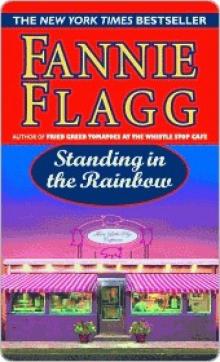 Standing in the Rainbow
Standing in the Rainbow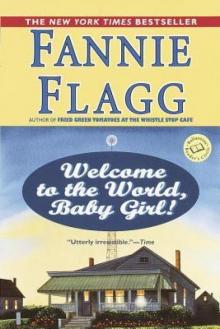 Welcome to the World, Baby Girl!
Welcome to the World, Baby Girl!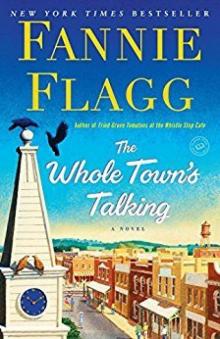 The Whole Town's Talking
The Whole Town's Talking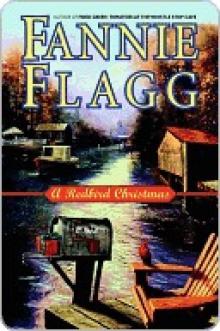 A Redbird Christmas
A Redbird Christmas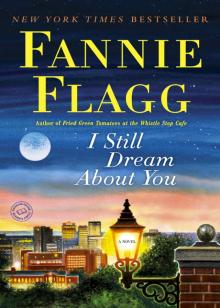 I Still Dream About You
I Still Dream About You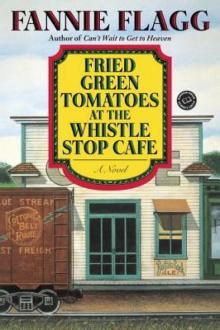 Fried Green Tomatoes at the Whistle Stop Cafe
Fried Green Tomatoes at the Whistle Stop Cafe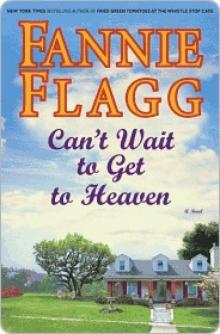 Can't Wait to Get to Heaven
Can't Wait to Get to Heaven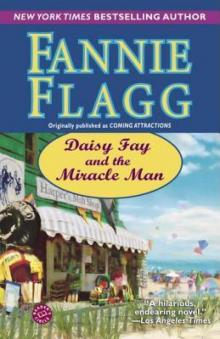 Daisy Fay and the Miracle Man
Daisy Fay and the Miracle Man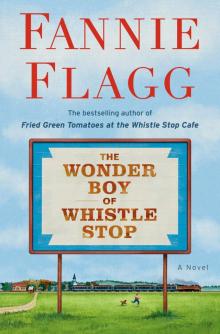 The Wonder Boy of Whistle Stop
The Wonder Boy of Whistle Stop The All-Girl Filling Station's Last Reunion
The All-Girl Filling Station's Last Reunion I Still Dream About You: A Novel
I Still Dream About You: A Novel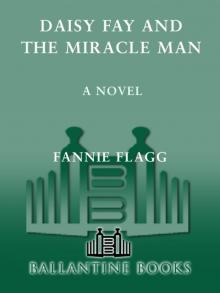 Daisy Fay and the Miracle Man: A Novel
Daisy Fay and the Miracle Man: A Novel